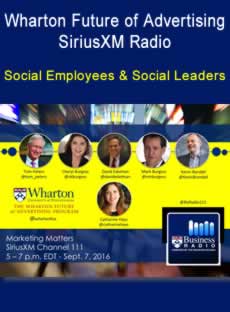What does the word “social” mean to you? When asked a question like this, many of us might roll our eyes at how obvious the answer seems. Nevertheless, I found myself chewing on this idea lately after a tweet I received from Tom Peters (@tom_peters) a little over a week ago:
.@ckburgess Dependent upon age, profession, etc, I think 10 people mean 10 different things today when they utter “social.”
— Tom Peters (@tom_peters) April 25, 2014
Naturally, I suspected that he was right. So, using the hashtag #SocialMeans, I decided to put Peters’s claim to the test. The results are still coming in, but despite some similarity in underlying concepts, the answers were indeed varied: Tweets about “#SocialMeans”
So what does this little experiment mean? The term “social,” regardless of what other words we attach to it (i.e., “media,” “business,” “employee,” “executive”), is at once both a straightforward concept and one rich in nuance. Think about the many ways you interact with people on a daily basis, and you’ll see that social dynamics are always in flux. The rules of engagement change depending on our relationship with a person: we tend not to talk the same way to our baristas as we do to our family, nor do we engage with our family the same way on Facebook or Twitter as we do in person in the comfort of our homes. It’s clearly a flexible term, a fact that helps to account for its liberal use in business communities. However, according to Nilofer Merchant (@nilofer) in an article for Harvard Business Review last year, one unfortunate side effect of the proliferation of “social” terminology is that we not only sacrifice clarity in discussing their underlying concepts, but also the possibility implied by them. Says Merchant:
When we conflate the tools with the outcomes, I think we risk meaning and impact. When we all use more precise language, each of us will find that people understand our meaning, and more clearly see the light.
Merchant isn’t the only one to notice this apparent gap between what many business leaders think social means versus what it could mean. In an op-ed on his blog last fall, Brian Solis (@briansolis) observed the following:
It’s not that the ideas are losing or that the goals are without merit, they are. The problem is that the deeper meaning and richer context is being lost on executives who still think the word “social” indicates a frivolous time-wasting pursuit. To them, it’s about what someone ate for lunch. Or it’s that thing their teenagers do to ignore them at the dinner table.
Anyone who is in the field of social business advocacy has likely run up against this problem. When we say “social business,” the only word that seems to register is “social,” which tends to carry connotations so far removed from what we mean when we say it that it often hampers our evangelism efforts. Clearly this is not what we intend, but what do we do? To Solis, the solution is simple:
Your assignment, should you choose to accept it, is not to get caught up in the words, but to connect with each other and figure out how to re-imagine our broken corporations and set about trying to fix them.
Both Merchant and Solis are ultimately making the same point: the ideas and practices that we wish to champion are ultimately more important than the terms we use to try to capture them. And sometimes we get so excited about the possibilities implied by these concepts that we don’t take the time necessary to develop a common lexicon in order to discuss them. But in absence of any better or emerging terminology, “social” remains the best term we have available in order to get these conversations started. And if that’s the case, it’s up to us to be clear on what we mean when we use terms like “social business,” “social marketing,” or “social employees.” Sometimes in order to keep the conversation moving forward, we need to circle back and draw inspiration from where we started in order to refine the language we use and make sure it’s an asset rather than a hindrance in our advocacy efforts. If there’s a communication gap, the responsibility is on us as advocates to bridge it. Regardless of the terms we use, it’s important not just that we mean what we say, but that others understand what we mean when we say it. So what does “social” mean to you? Share your thoughts in the comments below, or tweet using the hashtag #SocialMeans.
Find out what “social” means to employees and how brands like, IBM, Adobe, Dell, Cisco empower their employees by becoming a social business by design. Tune in for LIVE podcast with the authors of The Social Employee, (McGraw-Hill, 2013) and Robert Thompson on May 12, 2014 at 10:00 a.m. PST.
Click here: LIVE podcast Monday, May 12, 2014 at 10 a.m. Pacific
We are excited to announce that we will be taking part in an upcoming podcast with Robert Thompson (@RobertHThompson) for his Thought Grenades blog. The podcast, set to broadcast on Monday, May 12 at 10 PST, will explore many of the concepts in our Amazon best-selling book, The Social Employee (McGraw-Hill, 2013).
 Thompson, a leadership writer, speaker, and author of the book The Offsite: A Leadership Challenge Fable, specializes in executive coaching and empowering today’s leaders for the dawning era of social business. With the idea of the social executive a topic of focus both in the The Social Employee and in our own thought leadership posts here on our blog, the conversation is sure to be an exciting meeting of minds.
Thompson, a leadership writer, speaker, and author of the book The Offsite: A Leadership Challenge Fable, specializes in executive coaching and empowering today’s leaders for the dawning era of social business. With the idea of the social executive a topic of focus both in the The Social Employee and in our own thought leadership posts here on our blog, the conversation is sure to be an exciting meeting of minds.
You can listen to the podcast here. And be sure to check out Thompson’s rich archive of podcasts. Past conversations have featured Alan G. Robinson and Dean M. Schroeder, co-authors of The Idea Driven Organization; Joseph A. Michelli, author of Leading the Starbucks Way; and Carmine Gallo, author of Talk Like TED.
Below are recent endorsements for The Social Employee (McGraw-Hill, August 2013) by Tom Peters and David Aaker on their social networks, but if you want to see more of their endorsements click here.

In The Social Employee, we go behind the scenes with several leading brands—such as IBM, AT&T, Dell, Adobe, Southwest Airlines, Cisco, Acxiom, and Domo—pulling the lid off the inspiring social business success stories that have propelled these companies into the 21st century. These cutting-edge brands have all come to the same realization: the path to social business lies through empowering the social employee.
See what others are saying about The Social Employee and order your copy today!
Please check out @SocialEmployee media buzz! 
“Great brands have always started on the inside, but why are companies taking so long to leverage the great opportunities offered by internal social media? . . . The Social Employee lifts the lid on this potential and provides guidance for businesses everywhere.” —JEZ FRAMPTON, Global Chairman and CEO, Interbrand
 The Social Employee offers an unparalleled behind-the-scenes look at the social business success stories of some of the biggest brand names in the business world, including IBM, AT&T, Dell, Adobe, Southwest Airlines, Cisco, Acxiom, and Domo. These cutting-edge brands have all come to the same realization: the path to social business lies through empowering the social employee.
The Social Employee offers an unparalleled behind-the-scenes look at the social business success stories of some of the biggest brand names in the business world, including IBM, AT&T, Dell, Adobe, Southwest Airlines, Cisco, Acxiom, and Domo. These cutting-edge brands have all come to the same realization: the path to social business lies through empowering the social employee.
The brands that leverage their employee base in order to engage customers and prospects through social media are the ones destined to win the marketing wars. This book not only details the astronomical rise of the social employee, but also outlines the innovative methods that leading companies have employed to foster cultures of enthusiastic and engaged workers.
FOR EWORD by David C. Edelman, Global Co-Leader, Digital Marketing & Sales Practice, McKinsey & Company
EWORD by David C. Edelman, Global Co-Leader, Digital Marketing & Sales Practice, McKinsey & Company
AFTERWORD by Kevin Randall, Vice President of Brand Strategy & Research at
Movéo Integrated Branding, and journalist for The Economist and Fast Company
Download ~> Free Chapter 3 – “Brands Under Pressure”



